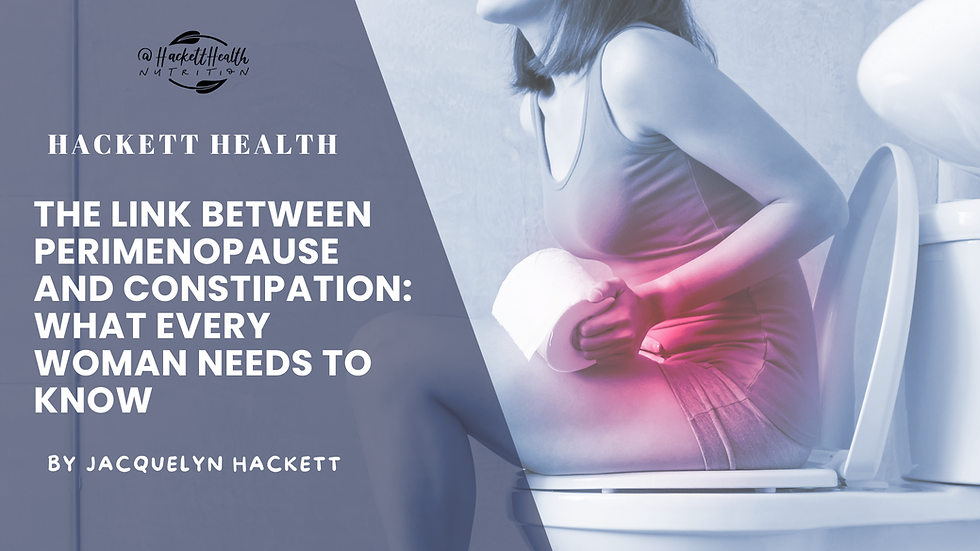The Link Between Perimenopause and Constipation: What Every Woman Needs to Know
- jackiehptla
- Jul 31, 2025
- 4 min read
Struggling with constipation in your 40s even though nothing's changed in your diet or routine? You're not alone, and you're definitely not imagining it. For many women, perimenopause brings with it a host of new symptoms, and digestive shifts like constipation are often overlooked or brushed off as 'normal aging'
But there's more to it. Hormonal changes during perimenopause can have a direct impact on how your gut functions. At The Functional Gut Health Clinic, we help women understand these shifts so they can get the right support not just more fiber or water
Let’s break down why this happens and what you can do about it

What Happens to Hormones During Perimenopause?
Perimenopause is the transitional period before menopause, and it can start in your mid-to-late 30s, though most women notice changes in their 40s. During this time, your hormones start fluctuating significantly
The typical pattern during perimenopause:
Progesterone drops first
Estrogen becomes dominant, either by staying high or fluctuating more dramatically
This imbalance is known as estrogen dominance, even when both hormones are on the decline overall
How This Affects Your Digestion
Progesterone helps stimulate gut motility, basically it helps keep things moving. So when progesterone drops, digestion slows down. You might feel heavier, more bloated, or just stuck
Estrogen plays a role in bile production, too much estrogen (relative to progesterone) can reduce bile flow. That leads to harder, drier stools and more strain during bowel movements
The Cortisol Connection: Stress Makes Things Worse
Perimenopause also increases your sensitivity to stress. With hormonal shifts, you may find yourself reacting more strongly to things you used to handle with ease-whether it’s work stress, parenting, or poor sleep
Increased stress raises cortisol, which can:
Disrupt your gut-brain communication by impairing the vagus nerve
Suppress the digestive enzymes your body needs
Lead to blood sugar fluctuations and systemic inflammation
All of these factors contribute to slower gut motility and make constipation worse
The Gut Microbiome Also Shifts in Perimenopause
Hormonal shifts don’t just affect your mood or energy, they change your microbiome too
As estrogen declines, there's often a reduction in beneficial bacteria like Faecalibacterium prausnitzii and Roseburia species. These are the bacteria responsible for producing butyrate, a short-chain fatty acid that supports healthy bowel movements and reduces inflammation
At the same time, the estrobolome, the collection of gut microbes that help metabolize estrogen, can get disrupted. When this happens, an enzyme called beta-glucuronidase can rise, recirculating estrogen and making hormonal imbalances worse
All of this leads to a perfect storm:
Less bile
Less butyrate
More sluggish digestion
And more hormonal chaos
Even if your diet hasn’t changed, your body’s ability to process food and eliminate waste has
So, What Can You Do About It?
If constipation has become a frequent visitor in your 40s (or even your 30s or 50s), know that your body might just need a new kind of support. This doesn’t mean your routine is failing, it means your hormones have changed the game
At The Functional Gut Health Clinic, we take an integrative, root-cause approach to address these changes. How we support women with hormone-related constipation
1. Magnesium (glycinate or citrate)
Supports motility, helps you relax, and improves sleep. Magnesium is often depleted during stress and hormonal transitions
2. Digestive bitters or enzymes
If your digestion feels sluggish or meals sit heavy, these can help your body break down food and stimulate bile flow
3. Microbiome support
Targeted probiotics and prebiotics can help restore the balance of gut bacteria affected by hormonal changes
4. Cycle-aware nutrition
Even if your cycle is irregular, tuning into its patterns can help us tailor support throughout the month
5. Stress and sleep strategies
Regulating your nervous system helps restore the gut-brain connection and supports smoother digestion
Why Testing Matters
If you're in your 40s or beyond and noticing new gut symptoms, constipation, bloating, sluggishness, it might be time to dig deeper. We often recommend hormone testing, like the DUTCH test, to look at how your cortisol, estrogen, and progesterone levels are functioning over the course of a day
We may also suggest a GI-MAP stool test to check for beta-glucuronidase levels and see how your microbiome is impacting hormone metabolism
Final Thoughts
You don’t have to live with the discomfort of constipation or chalk it up to 'getting older'
These symptoms are your body’s way of telling you it needs a new kind of support—one that looks at your gut and hormones together
Whether you’re dealing with new digestive issues or feeling like your go-to remedies aren’t working anymore, this could be your body’s quiet signal that something has shifted
We’re here to help you understand those signals and create a plan that supports you through every hormonal stage
FAQs on Perimenopause and Constipation
Q: Is constipation a common symptom of perimenopause?
Yes, many women experience new or worsening constipation during perimenopause due to hormonal changes affecting gut motility, bile production, and microbiome balance
Q: Why does progesterone affect bowel movements?
Progesterone helps stimulate smooth muscle activity in the gut. When levels drop, the digestive process can slow, leading to constipation
Q: Can stress make constipation worse in perimenopause?
Absolutely, rising cortisol levels during this phase can impair digestion, reduce enzyme production, and weaken the gut-brain connection
Q: Are probiotics helpful during perimenopause?
Yes, especially strains that support butyrate production and hormone metabolism. A personalized plan based on testing is ideal
Q: What tests can help identify the root cause of perimenopausal constipation?
Hormone testing like DUTCH, along with gut testing like GI-MAP, can uncover imbalances contributing to symptoms
Q: I’m in my late 30s, could this still be perimenopause?
Yes, perimenopause can start in your mid-to-late 30s, even if your cycles seem regular. Subtle changes in digestion, mood, or energy may be early signs




Comments